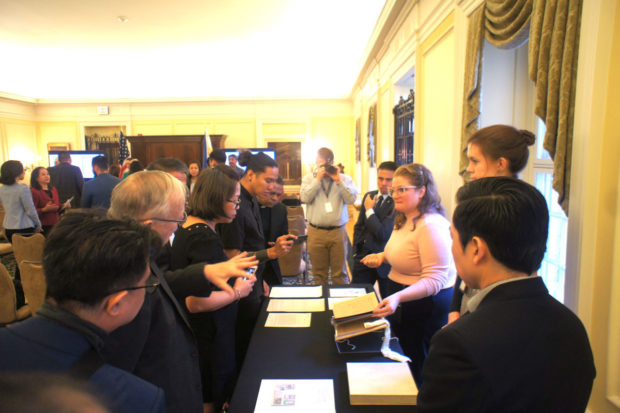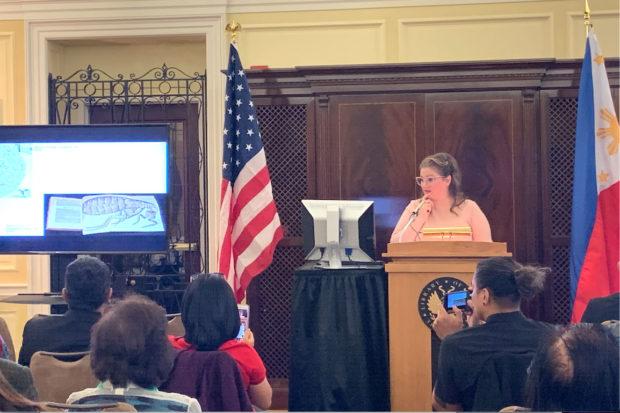Doctrina Christiana viewing held at Library of Congress in DC

Guests examine the Doctrina Christiana – first book printed in the Philippines – at a special viewing event held at the US Library of Congress (LOC) on October 28. CONTRIBUTED
WASHINGTON, D.C. — A special viewing of the Philippine rare book Doctrina Christiana took place at the Library of Congress Whittall Pavilion here on October 28.
The rare book is held by the LOC’s Lessing J. Rosenwald Collection. The viewing was organized by the Philippine Embassy, Principalia sa Bulalacao, and US-Philippines Society.
Consisting of 74 pages of text in Spanish, Tagalog transliterated into roman letters, and Tagalog in original Baybayin script, the Doctrina Christiana was printed in the Philippines in 1593 to assist in the conversion of Filipinos to Christianity.
It contains some of the basic prayers such as the Lord’s Prayer, Hail Mary, and the Salve Regina, as well as the Ten Commandments, and the Sacraments of the Holy Church.
The Doctrina Christiana is not only one of the earliest books printed in the Philippines. It has seminal significance to the country’s Christianity, the faith held by a huge majority of Filipinos. Apart from the LOC copy, there are no other known copies of Doctrina Christiana in existence today.
“It was clearly instrumental in the ‘conversion and instruction’ of Filipinos, to use the words of Governor Dasmariñas in his 1593 letter to King Philip II,” noted Minister Jose Victor V. Chan-Gonzaga who represented the Embassy, in brief remarks during the event.

Dr. Stephanie Stillo, Curator of the LOC Lessing J. Rosenwald Rare Books Collection, delivered a short lecture on the Doctrina Christiana at the special viewing event held on October 28. CONTRIBUTED
“The use of the ancient Baybayin script in some parts of the book likewise reminds all of us of the existence of pre-colonial Philippine culture. It bears witness to the narrative of a Philippine community that existed even prior to the arrival of the Spanish colonizers,” he added.
Dr. Stephanie Stillo, Curator of the LOC Lessing J. Rosenwald Rare Books Collection, delivered a short lecture on the Doctrina Christiana and how “the constellation of fortunate events” preserved the precious volume over the centuries, and through wars and natural disasters, with the surviving copy eventually finding a home at the Library of Congress.
Dr. Stillo and Rocky Andal Brito, Founder & Executive Director of the Principalia sa Bulalacao, then engaged the audience in a lively question and answer discussion on the history and significance of the Doctrina.
“The Doctrina Christiana offers a glimpse to the precolonial heritage of the Filipino people. It is a book on human values published during the Age of Discovery and is very much applicable to our modern society to teach us about kindness, generosity, humility and a plethora of principles on humanism. Perhaps, it is worth looking back to the teachings of the past and enter a new age —the Age of Rediscovery, for the betterment of the future and our posterity,” said Brito who conceptualized the special viewing.
After the discussion, the guests at the special viewing, including Rev. Monsignor Dennis Kuruppassery who represented the Holy See, were able to closely examine the Doctrina Christiana displayed on a table at the back of the pavilion.
“The presentation of the Doctrina Christiana was a uniquely informative event. First, the famed document stands as a rare example of 16th century innovations in print technology, fully deserving a place in the Library’s rare books collection. Second, the Doctrina provides insights into how Filipinos were introduced to the basic Christian texts. And third, the script confirms an advanced use of the written word in the Philippines’ pre-Hispanic period,” US-Philippines Society President Ambassador (ret.) John Maisto said in a statement after the forum.
“We thank the Library of Congress, especially the Rare Book & Special Collections Division, for this timely celebration of Philippine history and culture [as October is] Filipino American History Month, and which also happens to be National Indigenous Peoples Month in the Philippines,” Jose Manuel G. Romualdez also said in a statement.
Principalia sa Bulalacao is a cultural and heritage organization that seeks to “promote the rich culture and traditions of precolonial Filipinos and utilize cultural and historical links for positivity, empowerment, progress and understanding.”
The US-Philippines Society is a binational organization that tries to raise the profile of today’s Philippines in the United States through programs on business, governance, culture, shared history, education and strategic issues.
(L-R) Rev. Monsignor Dennis Kuruppassery; US-Philippines Society Executive Director Hank Hendrickson; Philippine Embassy Economic Minister Jose Victor Chan-Gonzaga; US-Philippines Society President Ambassador John Maisto; Founder & Executive Director of the Principalia sa Bulalacao Rocky Andal Brito; and Curator of the LOC Lessing J. Rosenwald Rare Books Collection Dr. Stephanie Stillo. (PHOTO: US-Philippines Society)

